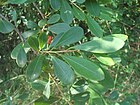Note: This is a project under development. The articles on this wiki are just being initiated and broadly incomplete. You can Help creating new pages.
Difference between revisions of "Erythroxylum monogynum"
| Line 1: | Line 1: | ||
[[File:(Erythroxylum monogynum) Red cedar foliage at Kambalakonda 01.jpg|thumb|right]] | [[File:(Erythroxylum monogynum) Red cedar foliage at Kambalakonda 01.jpg|thumb|right]] | ||
| − | '''Erythroxylum monogynum''' is valued for its wood, which is used locally. It also has medicinal applications, yields an essential oil and a wood oil. | + | '''Erythroxylum monogynum''' is valued for its wood, which is used locally. It also has medicinal applications, yields an essential oil and a wood oil. This plant is belongs to Erythroxylaceae family.<ref name="Plant family"/> |
==Uses== | ==Uses== | ||
| − | {{Uses|}}, {{Uses|}}, {{Uses|}}, {{Uses|}}, {{Uses| | + | {{Uses|Fever}}, {{Uses|Stomachache}}, {{Uses|Skin deceases}}, {{Uses|Joint pain}}, {{Uses|Kidney problems}}.<ref name="Uses"/> |
==Parts Used== | ==Parts Used== | ||
| Line 8: | Line 8: | ||
==Chemical Composition== | ==Chemical Composition== | ||
| − | <ref name=" | + | Phytochemical constituents of leaf of Erythroxylum monogynum were studied and |
| + | it was found that it contains alkaloids, carbohydrates, flavinoids and glycosides in all AqE, | ||
| + | AcE and CD.<ref name="Chemical Composition"/> | ||
==Common names== | ==Common names== | ||
| Line 67: | Line 69: | ||
==References== | ==References== | ||
<references> | <references> | ||
| − | + | <ref name="Chemical Composition">[https://www.tsijournals.com/articles/phytochemical-studies-and-demonstration-of-antimicrobial-activity-of-erythroxylum-monogynum.pdf Chemical constituents]</ref> | |
| − | <ref name=" | ||
| − | |||
<ref name="Leaf">[Morphology]</ref> | <ref name="Leaf">[Morphology]</ref> | ||
| − | + | <ref name="Plant family">Karnataka Aushadhiya Sasyagalu By Dr.Maagadi R Gurudeva, Page no:133 | |
| − | <ref name="How to plant/cultivate">[Cultivation]</ref> | + | </ref> |
| − | <ref name="Uses">Indian Medicinal Plants by C.P.Khare</ref> | + | <ref name="How to plant/cultivate">[Cultivation]</ref><ref name="Uses">Indian Medicinal Plants by C.P.Khare</ref> |
</references> | </references> | ||
Revision as of 16:03, 7 August 2020
Erythroxylum monogynum is valued for its wood, which is used locally. It also has medicinal applications, yields an essential oil and a wood oil. This plant is belongs to Erythroxylaceae family.[1]
Contents
- 1 Uses
- 2 Parts Used
- 3 Chemical Composition
- 4 Common names
- 5 Properties
- 6 Habit
- 7 Identification
- 8 List of Ayurvedic medicine in which the herb is used
- 9 Where to get the saplings
- 10 Mode of Propagation
- 11 How to plant/cultivate
- 12 Commonly seen growing in areas
- 13 Photo Gallery
- 14 References
- 15 External Links
Uses
Fever, Stomachache, Skin deceases, Joint pain, Kidney problems.[2]
Parts Used
Chemical Composition
Phytochemical constituents of leaf of Erythroxylum monogynum were studied and it was found that it contains alkaloids, carbohydrates, flavinoids and glycosides in all AqE, AcE and CD.[3]
Common names
| Language | Common name |
|---|---|
| Kannada | Natkadeodar |
| Hindi | |
| Malayalam | Devataru |
| Tamil | Sembulichan |
| Telugu | Gatiri |
| Marathi | |
| Gujarathi | |
| Punjabi | |
| Kashmiri | |
| Sanskrit | |
| English | Red Cedar |
Properties
Reference: Dravya - Substance, Rasa - Taste, Guna - Qualities, Veerya - Potency, Vipaka - Post-digesion effect, Karma - Pharmacological activity, Prabhava - Therepeutics.
Dravya
Rasa
Guna
Veerya
Vipaka
Karma
Prabhava
Habit
Identification
Leaf
| Kind | Shape | Feature |
|---|---|---|
Flower
| Type | Size | Color and composition | Stamen | More information |
|---|---|---|---|---|
| {{{5}}} |
Fruit
| Type | Size | Mass | Appearance | Seeds | More information |
|---|---|---|---|---|---|
Other features
List of Ayurvedic medicine in which the herb is used
Where to get the saplings
Mode of Propagation
How to plant/cultivate
Commonly seen growing in areas
Dry country in Sri Lanka, Evergreen forests.
Photo Gallery
References
External Links
- Ayurvedic Herbs known to be helpful to treat Fever
- Ayurvedic Herbs known to be helpful to treat Stomachache
- Ayurvedic Herbs known to be helpful to treat Skin deceases
- Ayurvedic Herbs known to be helpful to treat Joint pain
- Ayurvedic Herbs known to be helpful to treat Kidney problems
- Herbs with Fruits used in medicine
- Herbs with Leaves used in medicine
- Herbs with common name in Kannada
- Herbs with common name in Malayalam
- Herbs with common name in Tamil
- Herbs with common name in Telugu
- Herbs with common name in English
- Habit - Evergreen tree
- Index of Plants which can be propagated by Seeds
- Herbs that are commonly seen in the region of Dry country in Sri Lanka
- Herbs that are commonly seen in the region of Evergreen forests
- Herbs
- Pages without herbs images





